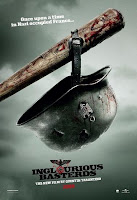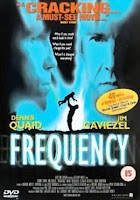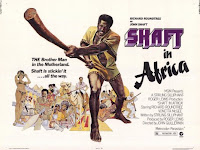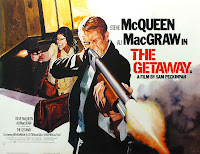
I read Nikki Finke's Deadline Hollywood Daily blog somewhat obsessively. After I saw Inglorious Basterds at Fantasia, I sent her a report and she quoted me in her blog. Here is what I sent her:
 When Inglorious Basterds was announced as the closing film at Montreal's Fantasia Film Festival, tickets sold out in under an hour. I only got a ticket because the organizers gave away 15 tickets to Festival regulars and they recognized me from going to the Festival since it started in 1996.
When Inglorious Basterds was announced as the closing film at Montreal's Fantasia Film Festival, tickets sold out in under an hour. I only got a ticket because the organizers gave away 15 tickets to Festival regulars and they recognized me from going to the Festival since it started in 1996.The theatre holds 700 and they were not letting in people with media or VIP passes. (A handful of VIPs mainly ones from the Festival jury were there.) They also were collecting cellphones and cameras from people going in (they had announced that prior to the screening) and passing metal wands to make sure we were hanest about not bringing in devices.
Eli Roth presented the film and did a quick Q&A afterwards. (About 7 or 8 questions.) He told us that Quentin couldn't be there because he was in Berlin on the press tour and then sucked up to the crowd telling them that we were the perfect crowd for the film (which is probably also true) and that Quentin had insisted that we see the film. He said that it was a difficult film, a ballsy film, but a great film and told us, "If you like it, tell your friends, blog about it, Twitter about it, write about it on Facebook and imdb. If you don't like it, Shut the fuck up!" (That got a big laugh.)
 He addressed stories about Tarantino recutting the film, saying that he had cut the version shown at Cannes in six weeks, that the version that they showed there had never been seen by a live audience and there were certain scenes that Tarantino didn't have time to cut that were added for the version that we saw and that certain scenes were tweaked after Cannes based on the reactions of the Cannes crowd, something that Tarantino had always planned to do.
He addressed stories about Tarantino recutting the film, saying that he had cut the version shown at Cannes in six weeks, that the version that they showed there had never been seen by a live audience and there were certain scenes that Tarantino didn't have time to cut that were added for the version that we saw and that certain scenes were tweaked after Cannes based on the reactions of the Cannes crowd, something that Tarantino had always planned to do.Roth talked about being cast for the film, saying that Tarantino was impressed by his performance in Death Proof and that Tarantino didn't audition him for the role and told him over dinner that he got it, saying that he had auditioned a few other actors to see if there were anyone better out there. "He said that it was either me or Adam Sandler and if he couldn't get one of us, he would rewrite the part. He said that he really wanted a Boston Jew in the part of the Boston Jew." Of the character, called by the Nazis, "The Bear Jew" because he beats Nazis to death with a baseball bat, Roth said, "When I lived in Boston I kept a baseball bat in my car and I didn't play baseball, so I figure I have been auditioning for this part my whole life."
Roth also explained how he came to shoot the German propaganda film within a film, The Pride of Germany. "When Quentin cast me, I committed to being there for the entire shoot, but there are sequences of the film my character isn't in, so I told Quentin if he wanted me to shoot any second unit stuff to give me a camera. He told me that he didn't normally use a second unit, but he hadn't figured out the German propaganda film yet, so I could shoot that if I wanted. I grabbed Daniel [Brühl] and a camera. The first day, we did 65 shots. Quentin called me and said, 'We did twenty shots!' Yeah? We did 65 mother-fucker! We ended up doing 200 shots in 3 days. When Quentin saw the footage, he loved it and asked me to cut it together for him. It ended up being 5 and a half minutes. If you watched it on its own it would seem a little disjointed because it is meant to be excerpts from a longer film, but you will be able to watch the whole thing on the DVD." Roth also said that he did an audio commentary for the film with the actor who played Goebbels doing commentary in character, but he wasn't certain that it would make the DVD because they pushed the envelope a little.
At the end of the Q&A, Roth talked about his next project saying that he was working on a PG-13 scince-fiction action thriller and he was hoping to shoot it in such a way that he could slip in a gory horror film at the end of the shoot like a movie based on the Thanksgiving fake trailer done for Tarantino's Grindhouse double-feature. He joked about Thanksgiving, "If Peter Jackson could shoot all three Lord of the Rings movies in one shoot, I figure I can do 20 Thanksgiving films in one go, and then I could really piss off the Saw guys by catching them and passing them with my Thanksgiving movies. They will be releasing Saw 8 and I will be putting out Thanksgiving 10!"
*****
 Eli Roth's first film Cabin Fever played at Fantasia in 2003 and got a really big reaction then, so that was probably why he was so happy to show us the film. It may have been playing to the audience to tell us that we were the perfect crowd for the film, but playing the film in Montreal, an international city where practically the entire audience speaks French and many also speak German, really helps in a film that features a lot of French and German since the French characters speak mostly French and the German characters speak mostly German. There were certainly jokes that the Montreal audience got that few other audiences would even notice. An early example saw the Nazi "Jew Hunter" Colonel Hans Landa (played by Christian Waltz) make a really dirty pun about the French dairy farmer's three daughters. Most Non-French audiences would probably understand that Landa was implying that he would have the daughters raped, the Montreal audience caught the overt threat and groaned/booed the pun and threat.
Eli Roth's first film Cabin Fever played at Fantasia in 2003 and got a really big reaction then, so that was probably why he was so happy to show us the film. It may have been playing to the audience to tell us that we were the perfect crowd for the film, but playing the film in Montreal, an international city where practically the entire audience speaks French and many also speak German, really helps in a film that features a lot of French and German since the French characters speak mostly French and the German characters speak mostly German. There were certainly jokes that the Montreal audience got that few other audiences would even notice. An early example saw the Nazi "Jew Hunter" Colonel Hans Landa (played by Christian Waltz) make a really dirty pun about the French dairy farmer's three daughters. Most Non-French audiences would probably understand that Landa was implying that he would have the daughters raped, the Montreal audience caught the overt threat and groaned/booed the pun and threat.And that was true for the entire film as the sell-out audience laughed at every joke, cheered for the Basterds and booed the Nazis. At the end, the audience gave the film a thunderous ovation, about half the crowd standing to do so, During the opening credits, the crowd gave large ovations to Quentin Tarantino, Eli Roth and Mike Myers. (Of course at Fantasia ovations have to be taken with a grain of salt. We're a quirky bunch. To keep the Hollywood types humble, the guy who routinely gets the loudest ovation at each and every screening (and yes at this one) is Daniel the Fantasia volunteer who sets up the mikes and turns out the lights for the screening.) I don't know if it was true that Quentin Tarantino did insist that this film had to play at Fantasia, but whoever insisted it was certainly a smart choice and the perfect audience for this film.
It doesn't hurt that Fantasia is a genre Festival, although it has had amazingly ecletic programming since the Festival started in 1996. They sold over 90, 000 tickets this year and while films like Inglorious Basterds sell out, you are just as likely to see a massive crowd for a gay Korean romantic comedy like Antique. Before Inglorious Basterds, they announced the winners for a variety of prizes with the most honored (and applauded) films being Love Exposure (a four hour Japanese art film), Breathless (Korean action/drama) and The Children (UK horror).
My review of the film is up on my blog, http://llakor.blogspot.com/



























